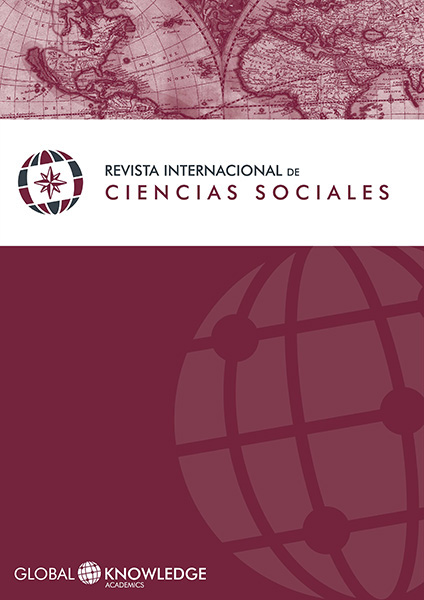Origins of Financial Crisis and Moral Risk
DOI:
https://doi.org/10.37467/gka-revsocial.v3.806Keywords:
Twin Crisis, Economic Cycle, Moral Risk, Complexity, Systems ApproachAbstract
This article sets out to explore the psychological, moral and philosophical dimensions as well as economic, administrative, financial and institutional aspects of financial crises, to understand this phenomenon from the paradigm of complexity and low systems approach. Our argument establishes that the finances have been enthroned in the entire social organization, becoming a true systemic transformation, called "financiarización", which requires seek their relations with the depths of human being (ethical behavior) and derive her major consequences (moral risk) that allow us to study in a comparative way, the latest financial crises and their impact in an emerging economy in Latin America, specifically Colombia.
Downloads
Global Statistics ℹ️
|
646
Views
|
857
Downloads
|
|
1503
Total
|
|
References
Aglietta, Michel y Reberioux. (2009). El capitalismo financiero a la deriva, el debate sobre el gobierno de empresa. Colombia: Publicaciones de la Universidad Externado de Colombia.
Amín Samir, Elmar Altvater, Morin Francoise y Gowan Peter. (2010). Crisis financiera, económica sistémica . Madrid: Maia Ediciones.
Dembinski, Paul H. (2010). ¿Finanzas que sirven o finanzas que engañan? España: Editorial Pirámide.
Fondo Monetario Internacional. (2009). World Economic Outlook.
Friedman, Milton. (1992). La economía monetarista . Barcelona: Editorial Gedisa.
García Reche, Andrés. (2012). “Riesgo moral”. El País, 10 de diciembre de 2012. http://ccaa.elpais.com/ccaa/2012/12/10/valencia/1355169617_545466.html.
Graham, Benjamín. (2009). El inversor Inteligente . Barcelona: Ediciones Deusto.
Keynes, John Maynard. (1936). Teoría general de la ocupación, el interés y el dinero. México: Fondo de Cultura Económica.
Leaven y Valencia. (2008). Sistemic BankingCrisis: A New Database . Fondo Monetario Internacional, Working Paper WP/08/224, septiembre 2008. DOI: https://doi.org/10.5089/9781451870824.001
López Garavito, Luis Fernando. (2011). Avatares del sistema financiero . Colombia: Editorial Universidad Externado de Colombia.
Lordon, Frederic. (2009). El porqué de las crisis financieras y cómo evitarlas . España: Los Libros de la Catarata.
Marichal, Carlos. (2010). Nueva historia de las grandes crisis financieras, una perspectiva global 1873-2008 . Buenos Aires: Editorial Sudamericana.
Martínez González-Tablas, Ángel. (2007). Economía política mundial. Barcelona: Editorial Ariel.
Marx, Karl. (1959). El Capital . México: Fondo de Cultura Económica, 2ª Edición.
Mondragón Báez, Héctor. (2009). Las crisis, ¿cuándo y por qué? Colombia: Ediciones Aurora.
Orlean, André. (2006). El poder de las Finanzas. Colombia: Editorial Universidad Externado de Colombia.
Pérez, Carlotta. (2010). “Dinamismo tecnológico e inclusión social en América Latina: una estrategia de desarrollo productivo basada en los recursos naturales”. Revista de la CEPAL (Santiago de Chile) No. 100 (Abr. 2010). pp. 123-145. DOI: https://doi.org/10.18356/0b1cb6b0-es
Schumpeter, Joseph A. (2002). Ciclos económicos: análisis teórico, histórico y estadístico del proceso capitalista . España: Editorial Prensas Universitarias de Zaragoza.
Downloads
Published
How to Cite
Issue
Section
License
Those authors who publish in this journal accept the following terms:
-
Authors retain copyright.
-
Authors transfer to the journal the right of first publication. The journal also owns the publishing rights.
-
All published contents are governed by an Attribution-NoDerivatives 4.0 International License.
Access the informative version and legal text of the license. By virtue of this, third parties are allowed to use what is published as long as they mention the authorship of the work and the first publication in this journal. If you transform the material, you may not distribute the modified work. -
Authors may make other independent and additional contractual arrangements for non-exclusive distribution of the version of the article published in this journal (e.g., inclusion in an institutional repository or publication in a book) as long as they clearly indicate that the work was first published in this journal.
- Authors are allowed and recommended to publish their work on the Internet (for example on institutional and personal websites), following the publication of, and referencing the journal, as this could lead to constructive exchanges and a more extensive and quick circulation of published works (see The Effect of Open Access).













